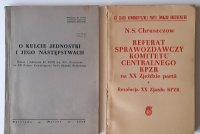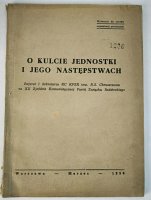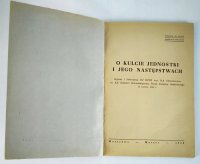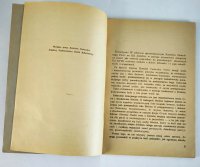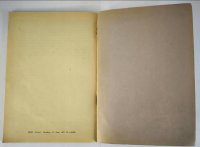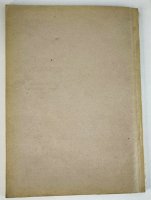Alexandru Matveev
Khrushchev, Nikita
O kulcie jednostki I jego nastepstwach [The personality cult and its consequences]
$1999
Item Details
Warsaw, 1956, Soft covers
First edition, Good
RARE FIRST EDITION, FIRST ISSUE of Khrushchev's 'Secret Speech'—A Landmark Document that Denounced Stalinism and Reshaped Global Politics. Together with official publication from XX party meeting which has no mention of anti Stalin speech.
With "Wylacznie do uzytku organizacji partyjnych" ("Exclusively for inner-party use") printed to top of front wrapper.
Numbered 1266.
Warsaw: March 1956. In original wrappers. With serial number stamped on front wrapper (1266). Chipping to spine. Minor staining.
On February 14, 1956, the 20th Congress of the Communist Party of the Soviet Union convened in Moscow—the first major party gathering since Joseph Stalin's death in 1953. For days, Stalin's name was barely mentioned. But on February 25, in a closed session attended by 1,500 delegates and specially authorized guests, First Secretary Nikita Khrushchev delivered a shocking address titled On the Cult of Personality and Its Consequences. In it, he launched a forceful condemnation of Stalin's legacy, aiming to dismantle the myth of Stalin as a heroic leader. Foreign journalists and non-party guests were barred, and the Polish translation—offered here in its scarce first printing—was the only version distributed during the Cold War. Notably, this edition retains interjections omitted in subsequent printings. The official Russian text was not published until 1989.
Khrushchev's four-hour speech detailed Stalin's crimes using official correspondence, internal reports, and personal testimony. He cited atrocities committed during the Great Terror of the 1930s, the disastrous Soviet unpreparedness for the Nazi invasion of 1941, the forced deportations of entire ethnic groups (including Kalmyks, Chechens, and Crimean Tatars), and Stalin's pervasive cruelty toward party members. Khrushchev even referenced Lenin's 1923 Testament, in which Lenin warned that Stalin was unfit to lead. The audience, stunned by the breadth of the revelations, listened in absolute silence. When Khrushchev concluded, there was no applause—only disbelief and a shaken silence.
By blaming Soviet abuses on Stalin's cult of personality rather than the Communist system itself, Khrushchev sought to preserve the Party while distancing it from its most brutal period. The speech marked the beginning of Khrushchev's de-Stalinization campaign and a return to an idealized Leninist model of governance.
The decision to deliver the speech was highly controversial. Khrushchev overcame resistance from Stalin loyalists on the condition that the speech would not appear in the official proceedings or the Soviet press. Nonetheless, transcripts were distributed to regional party branches, and through Eastern European contacts, the U.S. State Department eventually acquired a copy.
The global impact was immediate and far-reaching. Soviet sources reported that some delegates at the 20th Congress suffered heart attacks or committed suicide upon hearing the speech. Within the USSR, the public was deeply shaken. At the 1961 Party Congress, Stalin was denounced again—this time publicly—and his embalmed body was removed from Lenin's mausoleum in Red Square. Cities like Stalingrad were renamed. Years later, Mikhail Gorbachev would cite Khrushchev's boldness as foundational for his own reform agenda, calling the speech the first major step toward perestroika.
Internationally, the repercussions were equally profound. In Central and Eastern Europe, the speech ignited hopes of political reform, contributing to uprisings in Poland and Hungary and eventually ushering in the Khrushchev Thaw—a period of limited liberalization and the release of tens of thousands of political prisoners. The revelations also caused deep disillusionment among many Western Communists and surprised Western powers, especially after the U.S. State Department had publicly predicted that the congress would "probably not bring any surprises."
Khrushchev's speech and subsequent de-Stalinization campaign had profound repercussions across Asia. In China, Chairman Mao Zedong perceived the speech as a direct challenge to his own authority. It became a key factor in the eventual Sino-Soviet split. Mao condemned Khrushchev for straying from the ideological paths of Lenin and Stalin, while simultaneously reinforcing his own cult of personality under the guise of upholding Stalinist principles.
In North Korea, the effects were similarly destabilizing. Members of the Workers' Party of Korea attempted to challenge Chairman Kim Il Sung, accusing him of failing to reform his leadership style, violating the Leninist principle of collective leadership, cultivating a cult of personality, and employing arbitrary arrests and executions. (Lankov) The effort to remove Kim was swiftly crushed—the dissenters were branded as anti-party factionalists, arrested, and executed. In the aftermath, Kim intensified his authoritarian rule and further consolidated his personal power.
This exceptionally rare and significant first edition of Khrushchev's "Secret Speech" stands as one of the most consequential political texts of the 20th century. By portraying Stalin as a despot and mass murderer guilty of crimes against humanity, Khrushchev shattered the myth of Stalin as the heroic savior of the Soviet people. His bold denunciation triggered a political chain reaction across the Eastern Bloc and beyond—ultimately helping to set in motion the events that led to revolutions in Eastern Europe and the eventual dissolution of the Soviet Union.
Alexandru Matveev
Alexandru Matveev
80/3a sudecka
Wroclaw, Lower Silesia, 53-129
Poland
Phone: +48726443990
Featured Catalogue
Specialities
Eastern Europe, Poland, Rossica, Russia
More Information
Booth 4
Shipping and Returns
Estimated delivery time from 2 to 4 weeks to USA and 5 working days to Europe. Expedited shipping.30 day return guarantee, with full refund including original shipping costs for up to 30 days after delivery if an item arrives misdescribed or damaged.
Payment options: Bank transfer, PayPal.
Additional Information
I'm an independent bookseller/collector focusing mainly on Eastern European and Russian antiquarian books, with over 15 years of experience.![O kulcie jednostki I jego nastepstwach [The personality cult and its consequences]](https://bookandpaperfairsonline.us-east-1.linodeobjects.com/thumbs/1761130887file_00000000d8b86243a0bb31919a1edde5.jpg)
